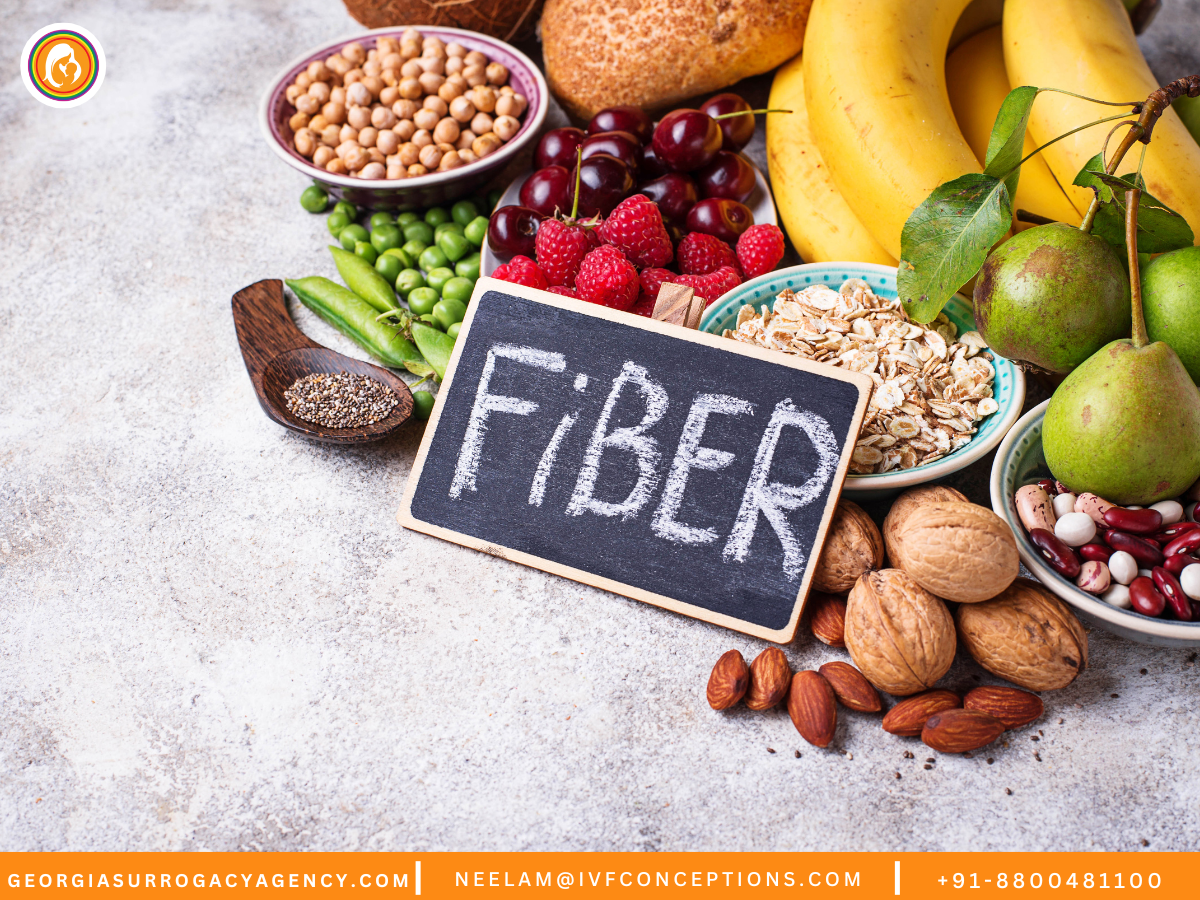10 Natural Ways to Boost Fertility: A Comprehensive Guide for Aspiring Parents
Fertility refers to the ability to conceive and carry a pregnancy to term. For many couples, this journey happens naturally, but for others, it can be challenging. Statistics show that more than 8 out of 10 couples, where the woman is under 40, will conceive within a year if they have regular, unprotected intercourse.
- Book an online appointment: Get a free online consultation.
- Call\W:+91-8800481100 Email:neelam@ivfconceptions.com
However, infertility affects approximately 10% of women aged 15-44 in the United States, making the journey to parenthood difficult for many.
The good news is that there are natural ways to enhance fertility, primarily through lifestyle and dietary changes. This guide explores 10 evidence-based strategies to naturally boost fertility, offering hopeful parents practical steps to improve their chances of conception.
More Resources to Read:
Infertility Treatment and Surrogacy Process
9 Factors To Improve IVF Pregnancy Rate
International Surrogacy Options Worldwide
Surrogacy Guide for Surrogate Mothers
Summary for Natural Ways to Boost Fertility
| Strategy | Description | Tips |
| 1. Choose Carbs Wisely | Opt for low-GI carbs and moderate intake to support hormonal balance and fertility. | Follow a Mediterranean-style diet with whole grains, vegetables, and legumes. |
| 2. Increase Fiber Intake | Helps regulate hormones and blood sugar levels, important for fertility. | Include fruits, vegetables, whole grains, and beans; aim for 25-30 grams daily. |
| 3. Avoid Trans Fats | Trans fats negatively impact ovulation and fertility. | Replace trans fats with healthy fats like those in avocados, nuts, and olive oil. |
| 4. Limit Caffeine | High caffeine intake can reduce fertility and increase miscarriage risk. | Limit to <200 mg/day; consider herbal teas as alternatives. |
| 5. Maintain Healthy Weight | Being underweight or overweight can disrupt ovulation and fertility. | Aim for a BMI of 18.5-24.9; combine diet with regular exercise. |
| 6. Supplement with Iron | Adequate iron levels reduce the risk of ovulatory infertility. | Include lean meats, beans, and spinach; consider a daily multivitamin with iron. |
| 7. Manage Stress | Chronic stress disrupts hormones, reducing fertility. | Practice relaxation techniques like yoga and mindfulness. |
| 8. Eat a Bigger Breakfast | Larger breakfasts help regulate glucose and insulin, improving fertility. | Include protein, healthy fats, and complex carbs; start your day with a balanced meal. |
| 9. Avoid Alcohol | Alcohol can reduce fertility and increase miscarriage risk. | Consider cutting out alcohol entirely when trying to conceive. |
| 10. Consider Natural Supplements | Certain supplements can support hormonal balance and reproductive health. | Bee pollen, maca root, and royal jelly are popular options; consult with a healthcare provider. |
Natural Ways to Boost Fertility for Intended Parents.
1. Choose Carbohydrates Wisely
Carbohydrates play a crucial role in fertility. However, the type and amount of carbs you consume can significantly impact your chances of conceiving:
- Low-Glycemic Index (GI) Carbs: Choose whole grains, vegetables, and legumes over refined carbohydrates like white bread and pasta. Low-GI carbs help regulate blood sugar levels, which is particularly important for women with polycystic ovary syndrome (PCOS).
- Moderate Carb Intake: Studies suggest that women who consume high amounts of carbohydrates are more likely to experience ovulatory infertility. A balanced diet with moderate carb intake is essential for hormonal balance.
Tip: Consider a Mediterranean-style diet rich in whole grains, fruits, and vegetables to support reproductive health.
2. Increase Fiber Intake
Fiber is vital for overall health and can significantly impact fertility by helping the body eliminate excess hormones and maintaining balanced blood sugar levels:
- Sources of Fiber: Include fruits, vegetables, whole grains, beans, and legumes in your diet. Aim for 25-30 grams of fiber daily.
- Balancing Fiber Intake: While fiber is essential, excessive intake can interfere with ovulation. A balanced approach is key.
Tip: Start your day with a high-fiber breakfast, such as oatmeal topped with fruits and nuts.

3. Avoid Trans Fats
Trans fats, commonly found in processed and fried foods, are harmful to fertility. They can negatively impact ovulation and increase the risk of infertility:
- Healthy Fats: Replace trans fats with healthy fats like those found in avocados, nuts, seeds, and olive oil. Omega-3 fatty acids, found in fish like salmon, are particularly beneficial for fertility.
Tip: Read food labels carefully to avoid trans fats and prioritize whole, unprocessed foods.
4. Limit Caffeine Consumption
High caffeine intake has been linked to reduced fertility and increased miscarriage risk. While moderate consumption is generally safe, it’s essential to monitor your intake:
- Recommended Limit: Limit caffeine consumption to less than 200 mg per day (about one 12-ounce cup of coffee).
- Alternatives: Consider caffeine-free herbal teas or decaffeinated coffee as alternatives.
Tip: Gradually reduce caffeine intake to minimize withdrawal symptoms.
5. Maintain a Healthy Weight
Body weight significantly influences fertility. Both underweight and overweight individuals may experience challenges in conceiving:
- BMI Considerations: Aim for a Body Mass Index (BMI) between 18.5 and 24.9. Women with a BMI outside this range may experience irregular menstrual cycles or anovulation.
- Weight Loss: Even a modest weight loss of 5-10% can improve fertility in overweight women.
Tip: Combine a balanced diet with regular physical activity to achieve and maintain a healthy weight.
6. Supplement Your Diet with Iron
Iron plays a crucial role in fertility. Women who do not get enough iron are at a higher risk of ovulatory infertility:
- Sources of Iron: Include lean meats, beans, lentils, spinach, and fortified cereals in your diet. If necessary, consider taking an iron supplement, but consult your healthcare provider first.
- Iron Absorption: Vitamin C enhances iron absorption, so pair iron-rich foods with vitamin C sources like citrus fruits.
Tip: A daily multivitamin with iron can help ensure adequate intake if dietary sources are insufficient.
7. Manage Stress Effectively
Chronic stress can interfere with hormone levels, affecting ovulation and reducing fertility. Managing stress is crucial for anyone trying to conceive:
- Stress-Reduction Techniques: Practice mindfulness, meditation, yoga, or deep-breathing exercises. Regular physical activity can also help reduce stress levels.
- Mind-Body Connection: Some studies suggest that women undergoing fertility treatments have higher success rates when they participate in stress-reduction programs.
Tip: Incorporate relaxation techniques into your daily routine to manage stress and improve overall well-being.
8. Eat a Nutrient-Rich Breakfast
Starting your day with a nutritious breakfast can positively impact fertility, particularly for women with PCOS:
- Balanced Breakfast: Include a mix of protein, healthy fats, and complex carbohydrates. This combination helps stabilize blood sugar and insulin levels, which can enhance fertility.
- Portion Size: Research shows that consuming a larger proportion of daily calories at breakfast, rather than dinner, may improve fertility markers.
Tip: Consider a breakfast rich in eggs, whole-grain toast, and avocado for a nutrient-packed start to your day.
9. Avoid Alcohol
Alcohol consumption can adversely affect fertility in both men and women. Even moderate drinking may reduce the chances of conception and increase the risk of miscarriage:
- Alcohol and Fertility: Research indicates that women who drink five or fewer alcoholic beverages per week have a higher risk of infertility.
- Healthy Alternatives: Replace alcoholic drinks with mocktails, sparkling water, or herbal teas during social gatherings.
Tip: If you’re trying to conceive, consider cutting out alcohol entirely to maximize your fertility.

10. Consider Natural Supplements
Several natural supplements have been shown to support fertility:
- Bee Pollen: Believed to improve ovarian function and support healthy hormone levels.
- Maca Root: Often used to enhance sexual desire and improve hormonal balance.
- Royal Jelly: Popular among women trying to conceive, this supplement is thought to support hormonal balance and overall vitality.
Tip: Consult with a healthcare provider before starting any new supplement to ensure it’s safe and appropriate for your needs.
Additional Resources to Read:
Can a Surrogate Mother Keep the Baby? Everything You Need to Know
Understanding Gay Surrogacy Costs – A Guide
How Much Do Surrogates Make – A Comprehensive Guide
Conclusion
Boosting fertility naturally involves a combination of healthy lifestyle choices, balanced nutrition, and stress management. While these strategies can significantly improve your chances of conceiving, it’s essential to remember that infertility can have complex causes. If you’ve been trying to conceive for over a year without success, consulting a fertility specialist is recommended.
Assisted Reproductive Technology (ART), including IVF, egg donation, and surrogacy, offers additional pathways to parenthood for those facing fertility challenges. For more information on these options, visit IVF Conceptions, where we provide legally secure and affordable surrogacy consulting services.
If you’d like to learn more about IVF, Egg Donation, or surrogacy services globally, check out the rest of our website at Georgia Surrogacy Agency. We offer legally secure and affordable surrogacy consulting services for FREE.
Get in touch for FREE SURROGACY CONSULTING:
Mobile: +91-8800481100 ( WhatsApp, Line, Viber)
Email: neelam@ivfconceptions.com

FAQs: 10 Natural Ways to Boost Fertility
- Can a low-carb diet improve fertility?
Yes, a low-carb diet, particularly one focusing on low-glycemic index foods, can help regulate blood sugar levels and improve hormonal balance, which is beneficial for fertility, especially in women with PCOS.
- How does fiber intake affect fertility?
Adequate fiber intake helps regulate hormones and maintain stable blood sugar levels, both of which are crucial for fertility. However, excessive fiber can interfere with ovulation, so a balanced intake is recommended.
- Why are trans fats harmful to fertility?
Trans fats can negatively affect ovulation and increase the risk of infertility. It’s important to avoid processed foods high in trans fats and instead consume healthy fats like those found in nuts, seeds, and fish.
- How much caffeine is safe when trying to conceive?
It’s advisable to limit caffeine intake to less than 200 mg per day (about one 12-ounce cup of coffee) to reduce the risk of infertility and miscarriage.
- What is the ideal weight for improving fertility?
A BMI between 18.5 and 24.9 is considered ideal for fertility. Being underweight or overweight can affect menstrual cycles and ovulation, so maintaining a healthy weight is crucial.
- Can iron supplements improve fertility?
- Yes, women with adequate iron levels have a lower risk of ovulatory infertility. Including iron-rich foods or supplements in your diet can support reproductive health.
- How does stress affect fertility?
- Chronic stress can disrupt hormone levels, affecting ovulation and reducing fertility. Managing stress through relaxation techniques can improve your chances of conception.
- Is eating a large breakfast beneficial for fertility?
Research suggests that consuming a larger breakfast, especially for women with PCOS, can help regulate insulin and glucose levels, which may improve fertility.
- Does alcohol consumption reduce fertility?
Yes, even moderate alcohol consumption can lower fertility in both men and women. It’s best to avoid alcohol when trying to conceive.
- What natural supplements can boost fertility?
Supplements like bee pollen, maca root, and royal jelly are believed to support fertility by promoting hormonal balance and overall reproductive health. Always consult with a healthcare provider before starting any supplement.

Highly esteemed, authoritative, and trusted professional with a 14-year of experience in international surrogacy. Advocate for Secure, Legal, and Affordable International Surrogacy.
Neelam Chhagani, MA (Counselling Psychology) and Holistic Infertility and Third-Party Reproduction Consultant.
Member of European Fertility Society, Best Surrogacy Blogger of 2020, with 300 dedicated blogs, and top contributor on Quora for Surrogacy.


Add Your Comment